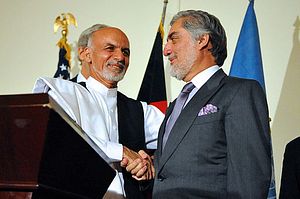This summer, Afghanistan’s Independent Election Commission (IEC) announced that the country would hold its long-delayed parliamentary and district council elections on July 7, 2018, almost three years past the expiry of the sitting parliament’s five-year mandate.
But the 2018 poll date looks to be an impossible milestone.
Everything from electoral technicalities to declining security in many parts of the country conspire to derail the election. As outlined in a recent New York Times article, the ranks of Afghan President Ashraf Ghani’s critics are growing in tandem with frustration about the slow pace of reforms and autocratic actions taken by the government to sideline dissenters and impede opposition from forming.
Afghanistan’s last election — the 2014 presidential poll — nearly ended in disaster, with the top two candidates at loggerheads over who really won amid rampant accusations of fraud. A deal brokered by then-U.S. Secretary of State John Kerry led to the formulation of the National Unity Government (NUG), with Ashraf Ghani (whom the IEC had declared the winner) as president and Abdullah Abdullah in the newly created position of chief executive officer.
The NUG agreement contained electoral reform as a core pillar, stating, “To ensure that future elections are fully credible, the electoral system (laws and institutions) requires fundamental changes… The objective is to implement electoral reform before the 2015 parliamentary elections.”
In September 2016, the Afghan parliament passed a new electoral law, which paved the way for the setting of an election date but also passed the “most controversial and complicated changes” onto the IEC, as Ali Yawar Adili and Martine van Bijlert wrote for the Afghanistan Analyst Network earlier this year.
In a pair of articles in November, Adili delved into the political and technical issues surrounding the planned July 2018 election.
The IEC and its sister body, the Electoral Complaints Commission (ECC), “are finding themselves under increasing fire from a growing number of political groups and election observer bodies.” Alternating accusations of corruption and government meddling led to calls for the commissioners to all be fired. Najibullah Ahmadzai, the IEC chairman, was fired in mid-November by Ghani.
A month later, the body remains headless and in turmoil, threatening to elect its own head if the government continues to delay. The IEC and ECC are the center of attention when it comes to electoral reform and the management of not only next year’s planned parliamentary and district council elections but the presidential election on the schedule for 2019.
Then there are the technical issues: budget for the parliamentary and district elections was recently estimated at $210 million dollars, most of which will need to come from international donors; security remains tenuous throughout the country, with the Afghan government estimated to “control or influence” only 56.7 percent of the country’s districts; aims to use high-tech elections equipment to ensure transparency — such as biometric voter registration — seem completely infeasible.
Electoral reform is a smokescreen for the real issue at the center of all the troubles Afghanistan presently experiences, from political wrangling among the central government in Kabul to the ongoing Taliban insurgency: who controls the levers of power.
As this part of Adili’s piece underscores, the electoral commissions are at the heart of this battle:
It is worth noting that all the various political forces, whether in government or out of it, consider it crucial who controls the two commissions, as they will play a crucial role in determining who will become Afghanistan’s next MPs and next president. They will play that role whether or not the elections are fair or rigged. This obsession with the commissions was manifested very vividly in the post-2014 electoral reform process, which, as AAN previously wrote, largely boiled down not to reform as such, but to “a tug of war over who controls the electoral bodies – and through them the election’s outcome.”
It would seem impossible for Afghanistan to manage an election as soon as next summer, but further delay pushes the image of even a nascent democracy in the country into the realm of true absurdity.

































